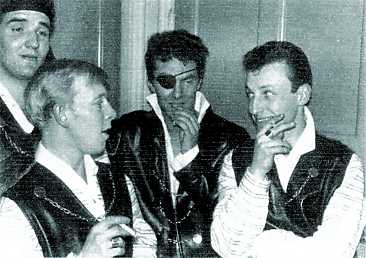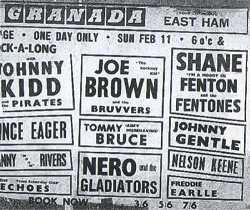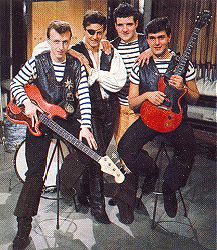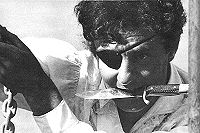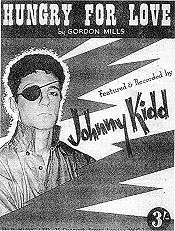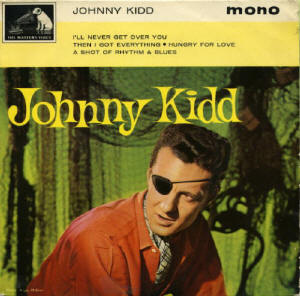3: 1962-63: I'll Never Get Over You
|
The departure of Kidd's first "power trio" naturally upset Kidd but the potential handicap of no backing group was solved with the arrival of the core of the Redcaps, a semi-professional rock 'n' roll act "discovered" at the same Wandsworth Town Hall once frequented by the Frederick Heath Combo. Johnny Patto (guitar), Johnny Spence (bass) and Frank Farley (drums) had previously backed Cuddly Duddly, and had a single to their credit with Dudley, "Sittin' On A Train." They were the recommendation of fellow Dormobile group Nero and the Gladiators, their acquisition probably made a bit easier by the fact their (and Dudley's) manager was one and the same Guy Robinson. By the September they had signed a five-year management deal with the George Cooper organisation.
On December 1st, Kidd entered the studio for a new single featuring the Mike Sammes Singers and orchestra. There were high hopes for this new approach and a bigger sound with Clive Westlake's interesting, bluesy "Hurry On Back To Love". It garnered favourable reviews but didn't chart and as the singer noted previous good reviews for "If You Were The Only Girl In The World" and "Linda Lu" meant little when both failed to dwliver!! The "B" side "I Want That "was another excellent, wild performance and who knows, it may even have been a better option for the topside, showing off Kidd’s powerful vocal delivery and featuring a rasping sax solo.
Johnny Kidd re-signed with EMI for another ten years, either an act of faith on the record company's part, or perhaps the 'new' band was viewed as having real potential despite having left the charts once. 1962 began with Johnny's contract being sold to the George Cooper Organisation under a new management and agency contract. Cooper and partner Harry Dawson managed many artists of the day like Joe Brown, the Tornados, Marty Wilde, Heinz, and now the "Admiral Of The Beat" himself. They would look after their roster arranging all radio and TV dates, attire, (even offering advice on investing their earnings) and filter through around two hundred songs for potential material. At one stage, Cooper tried to persuade Johnny to split from the Pirates, a short-lived suggestion that was flatly refused by their leader as they were an important part of his stage act. It would not be the last time such a plan would be suggested.
|
By March 1962 Johnny Patto left due to ill-health (he was suffering from ulcers) but later turned up in the Frays, recording one single "Walk On" for Decca. Spence and Farley then called in their old mate last seen in the Redcaps, Mick Green - they'd all known each other from the fifties having grown up in the same small area of Wimbledon. May 14th saw them break from a tour to play the first of four consecutive dates at Liverpool's famed Cavern Club, becoming the first Southern English Beat group to play there. There was fun onstage during their first appearance.
Mick Green - "Johnny would take out a cutlass while I was doing a heavy blues solo and at the crescendo of the solo he would throw the cutlass at my feet and it would stick into the wooden stage as part of the act. Johnny had the cutlass raised above his head, I looked down at the stage and realised that where the lino had been worn away [it] was not wood but concrete..... I nodded my head and yelled 'no' but Kidd thought I was getting really into it and just threw it and it landed inches from my foot and bounced into the audience, one of whom ran out of the Cavern with it."
It took some time chasing by their Road Manager Johnny Irving before he managed to rescue it. Cavern gigs proved not a little unnerving as many local group leaders were in the audience to pick up ideas, thus proving the band's popularity amongst the Beat fraternity.
Frank Farley - "We used to go and play the Cavern, lunch time session and evening session. At each there would be local bands, i.e. the Beatles, Gerry and the Pacemakers, Pete Maclaine and the Dakotas, the Big Three and another great band, Kingsize Taylor and the Dominoes. They played a lot of R&B numbers from America that most of the bands and general public down South in London had never heard."
|
The new line-up made their first trip to Hamburg in July, topping the bill at the Star Club and breaking attendance records with over 4000 attendees on some nights of their four-week stint. Whilst in Hamburg they came across many of the Merseyside groups doing the same rounds and playing a similar selection of R&B numbers. The stint tightened up the Pirateís sound, Greenís unique style of combining inventive rhythmic figures with sudden savage attacks coupled with Farley's powerhouse drumming and Spence's thumping bass complemented Kidd's powerful voice, and on stage they were simply electrifying.
On this tour the Club give them a large backcloth on which was a galleon as if in port, painted by some local students. The Pirates developed a quite striking image, wearing blousons, striped jeans and knee-high boots. Kidd, still wielding and occasionally throwing his antique cutlass as insurance allowed, left dents in stages, much to the annoyance of many venues' managers. (Their Road Manager Johnny Irving was so impressed with the lighting in the club that he developed a small set-up for Kidd and Co.) Live, they were almost unsurpassable.
David "Screaming Lord" Sutch - "The curtains would part and a galleon, 20 foot high and 40 foot long, painted ultra-violet, hit you in the face. He'd stroll on clad in black leather, looking very sinister, with chains hanging from the cuffs of his jacket. His vocals were raw, but superb as he smashed his rapier to the beat."
At the end of this sojourn it came as no surprise to learn that "Shakin' All Over" was top of the German hit parade. On August 10th Johnny and the Pirates were supported by the Beatles plus Pete MacLaine and the Dakotas on a special Liverpool Riverboat Shuffle organised by the Cavern. Pete Best drummed with the Beatles on that trip but only for a short while longer: within the week he'd been replaced by Ringo Starr.
